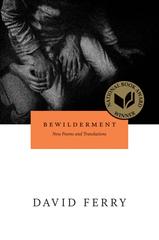 David Ferry, a poet and translator "whose direct, emotionally resonant work plumbing the chasms between the knowable and the unknowable won him broad praise and honors late in his career, including the National Book Award when he was 86," died November 5 at age 99, the New York Times reported. Ferry spent nearly 40 years teaching literature at Wellesley College, and "during that time he published just two books, both of poetry, with 23 years between them. He was admired as a critic and a teacher, but not as a poet, except within a small circle of admirers."
David Ferry, a poet and translator "whose direct, emotionally resonant work plumbing the chasms between the knowable and the unknowable won him broad praise and honors late in his career, including the National Book Award when he was 86," died November 5 at age 99, the New York Times reported. Ferry spent nearly 40 years teaching literature at Wellesley College, and "during that time he published just two books, both of poetry, with 23 years between them. He was admired as a critic and a teacher, but not as a poet, except within a small circle of admirers."
After he retired at 65 in 1989, he wrote 10 books over the next 34 years, including five of new and collected poems. Initially he translated classical texts, though he did not know Latin or Greek and lacked a grounding in classical writing. His first post-retirement book, a translation of the ancient Babylonian epic Gilgamesh (1993), was a New York Times Notable Book of the Year. He later won praise for translations of the Roman poets Horace and Virgil, including Virgil's epic The Aeneid (2017).
Ferry's reputation as a translator contributed to his poetry being at times overlooked, until he won the National Book Award in 2012 for Bewilderment: New Poems and Translations. Other works include Dwelling Places: Poems and Translations (1993), Of No Country I Know: New and Selected Poems and Translations (1999), and On This Side of the River: Selected Poems (2012). His final book, Some Things I Said, will be published in December by Grolier Poetry Press.
Ferry "spoke of living in a state of constant bewilderment--not just him, but everyone, and everything," the Times wrote. "The world is slippery, and nothing, not even words as concrete and precisely chosen as his, could capture it in full.... Even his poems were bewildered, he said, and believed his job was to help them find their way. When writing, he started with a line and worked it out from there on a path of mutual discovery, both for him and for the poem."
He revered Robert Frost and Wallace Stevens, "and like them wrote in a direct, quietly devastating style. It is not frilly or overly difficult, though in its richness it contains multitudes that reward frequent rereadings," the Times noted, adding that he "deployed metaphor sparingly and precisely, never to show off, as in his poem 'Lake Water,' an elegy to his wife, the critic Anne Ferry":
When, moments after she died, I looked into her face,
It was as untelling as something natural,
A lake, say, the surface of it unreadable,
Its sources of meaning unfindable anymore.
Her mouth was open as if she had something to say;
But maybe my saying so is a figure of speech.
Former U.S. poet laureate Robert Pinsky told the Boston Globe: "David Ferry inspired many other poets with his penetrating, unique verbal music. Also inspiring to me and many others is David's lifelong devotion to the art of poetry as a source of joyful wonder--for himself, for his friends and students, and for his readers." Bewilderment is available from the University of Chicago Press.

